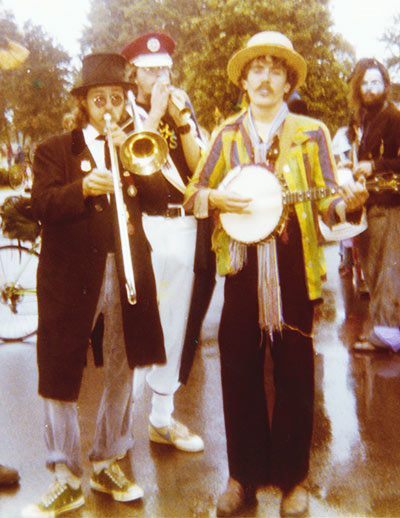Saint Peter
Author: Robert Force
Date/Studio: 1989 Unknown, Edmonds, WA
Engineer: Unknown
Producer: Robert Force, Albert d'Ossché
Original Release: Double Dulcimer Magic (GM107)
Current Release: The Complete Recordings (BSR 158)
 Albert and I went through a very political stage in our songwriting. None of that actually ever got onto vinyl with the exception of this tune, and then only as an instrumental. The late 60s and early 70s were political times in America. Folk singers and pop groups all had something to say. Bob Dylan made his career on the subject. Joan Baez, Buffy St, Marie, Phil Ochs-- the list goes on. Underneath all of the “new stuff” were the continued contributions of Pete Seeger, long a politicized folk singer.
Albert and I went through a very political stage in our songwriting. None of that actually ever got onto vinyl with the exception of this tune, and then only as an instrumental. The late 60s and early 70s were political times in America. Folk singers and pop groups all had something to say. Bob Dylan made his career on the subject. Joan Baez, Buffy St, Marie, Phil Ochs-- the list goes on. Underneath all of the “new stuff” were the continued contributions of Pete Seeger, long a politicized folk singer.
Rock and roll opened up and stepped aside for a new genre, Folk Rock-- electric music with the beat of rock and the soul of folk. Early “hits” like these were tunes like Barry McGuire's, Eve of Destruction, the Buffalo Springfield's' generation defining, For What It's Worth, and later, Country Joe McDonald and the Fish singing their iconic, I Feel Like I'm Fixin' To Die Rag. Al and I were no exception but by the time we got around to recording, protest songs were no longer in vogue and we set them aside.
Saint Peter quite frankly says that to be a fringe element in society was to present yourself as a target. The era of “big lie” politics was-- if not born-- then again at least in full ascendency. Saint Peter himself is downgraded and moved to a position where he could be marginalized. Voices of Reason were being silenced with the simple exigency of painting them black in the press, “They've locked up the sheriffs and the bad man's on the loose, stealing souls for fool's gold and trampling holy truths.”
This was the general feeling of the country in the fall of 1974. Nixon had just resigned the month before, the fall of Saigon was still a year away; a lot of politicians were scrambling to consolidate power and find the new band wagon. Meanwhile our band wagon-- Izzy the green '63 VW bug-- was chugging her way east up over the Kemmerer Pass between Idaho and Wyoming. We had just played in Pocatello and were on our way to Connecticut to rehearse-- woodshed-- for our In Search debut tour.
Most everyone of that generation affected some sort of outlandish costume. Mine was Boy Scout shirts and striped marching band pants. (I never sewed a patch onto the shirt that I didn't feel I'd earned.) Al's costumes ran to leather pants and colorful head scarves. Both of us wore double-soled Walter Dyer elk hide moccasins and sported obscure pins and buttons with double entendres that said things like, “Omaha-- the key to success”. Maha was also Sanskrit for “great”-- oh Greatness!
The tune starts off with me asking Albert to roll up the window. A big, black-diesel-belching truck was passing us and I didn't want to smell the fumes. We both enjoyed low-octane Mexican marijuana so I tell him I'll pass him the joint if he does. Before long the dulcimer is out and he is chugging away on what we called an “Appalachian run around” – a simple fiddle tune type melody-- throwing words at each other and laughing. We did so like to entertain ourselves. It was never, “Hey, let's write a song”.
A historical footnote: Marijuana was considered evil in those days. You could go to jail for a long time. On the other hand, alcohol was fine and drunks were just good ol' boys out having a good time. Alcohol was not a problem. This thinking was to go on for another fifty years.
With grass you had to be attentive, it had little round seeds that would roll away and get lost. Because of the way we looked, long-hair and funny clothes, we knew we were easy targets. Our simple defense was to eat peanuts in the car and throw the shells on the floor four-inches deep to cover them up.
We also kept a pint of Jack Daniels Black behind the seat. If we were ever stopped we figured that's what they'd find and we could be just good ol' boys. Jack also came in handy before shows. Al and I would often talk over our set list with him in the parking lot. He almost always had good advice.
